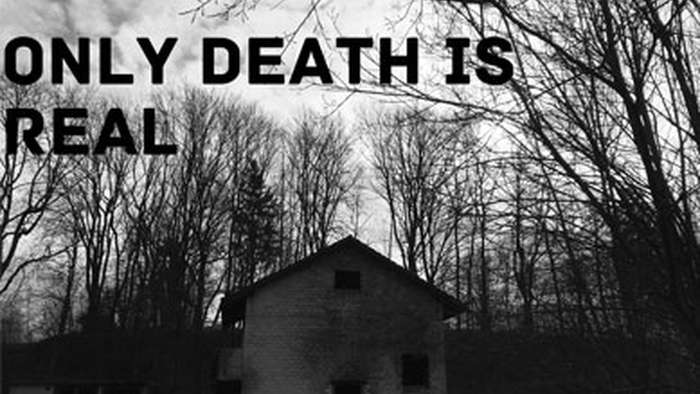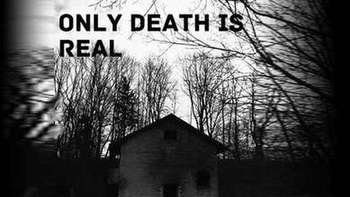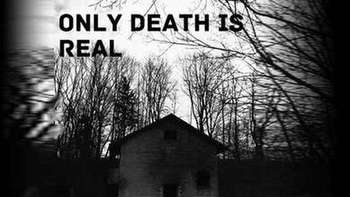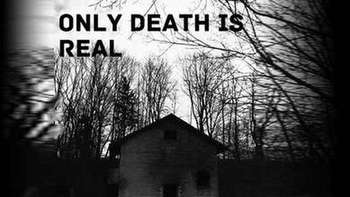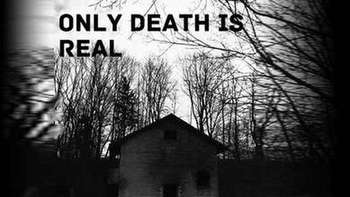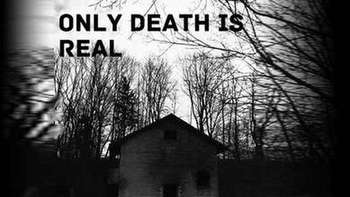2020 has only been upon us for three short months, yet the outlook for the rest of the year looks as bleak as it has ever been. Pandemics, floods, ineffective governments, dysfunctional rulers..... the list could go on but I fear that life is depressing enough already. The music contained within this edition of Only Death Is Real goes some way to speak out against the hardships that many people face daily and propagate the idea that music itself, can be a great sense of comfort and a powerful force in this fight.
 Ancst - The Darkening (Yehonala Tapes/Lifeforce Records)
Ancst - The Darkening (Yehonala Tapes/Lifeforce Records)
Germany’s Ancst are usually quite a prolific band so it speaks volumes to their personal situation when the last music we heard from them was in 2018. The Darkening seems to be a rebirth, a reboot, if you will, for the Berlin-based project and these two songs are as full of rage as anything that they’ve created before. Somewhat lacking in the black metal edge of their previous works, “Abysm of Existence” and “Stagnant Oblivion” still hold a blackened edge, however the hardcore inspired elements of the Ancst sound take precedence and give them a fire that seems much needed.
 Asgrauw - IJsval (Death Kvlt Productions)
Asgrauw - IJsval (Death Kvlt Productions)
Dutch entity Asgrauw are by no means new to the black metal underground, and the energy that is found on newest full length, IJsval, is that of a band that are aware of their strengths after so much time together. In the ten years since their inception, Asgrauw have built their sound to its peak and IJsval is the culmination of much hard work. Taking their inspiration from the imminent death of the Earth, Asgrauw have created a work that is based in pain and in anguish and is misanthropic to its core – humanity has brought this destruction on itself and does not deserve to be saved.
“Nevel” is a fiery, punchy track that pays homage to the icy winds of the second wave of black metal while also sounding modern and fresh. The guitar lines are captivating and the drumming is given plenty of space to power the song forward while the two vocalists keep their tones on the raw side with harsh shouts giving the rage room to grow – the dual vocal approach does much to allow Asgrauw to explore different qualities and in turns elevates the sound somewhat.
Melody plays a large part in the sound of IJsval and during “Broeihaard,” sly moments of groove creep into the base of the song; slower passages build atmosphere while the more headstrong elements are then much more keenly felt in contrast. The songs are rendered in a Dutch language dialect, so references are made through the sweeping guitars, screams and moments of reflection, yet the message seems to be clear – pain is all around us and will never see and end.
 Axebreaker - Vigilance (Independent/Obsolete Units)
Axebreaker - Vigilance (Independent/Obsolete Units)
Power electronics has the tools to use harsh, unyielding sounds to create textures of aggression, without using so many words, lyrically, to describe downfall, destruction or death. Axebreaker uses those tools to its full advantage, with founder Terence Hannum (Locrian, The Holy Circle) bringing together field recordings, synths pushed to their limits and droning layers to create a work that speaks of violence and the rise of religious intolerance.
Vigilance is a terrifying take-down of just how far gone much of America is, in the era of Trump and the casual acceptance of racist ideology and Hannum’s aim is to take back the power into the hands of the people. “Abdication” is a painful expression of the desire for those in power to give up their seats of control while “Tolerance” pushes echoing vocal shouts behind constantly moving drones and electronic pulses, building the perfect storm of sounds to construct a sense of sorrow within its otherwise harsh noise.
 Lychgate - Also Sprach Futura (Debemur Morti Productions)
Lychgate - Also Sprach Futura (Debemur Morti Productions)
Lychgate are one of the more interesting propositions in the current black metal scene with the band taking their cues from doom – vocalist Greg Chandler is in the funeral doom band Esoteric – and the avant-garde. Also Sprach Futura is a twenty minute EP that brings together all elements of the Lychgate sound in a short, sharp release that showcases their grasp of the weird and their ability to twist it into something bizarrely listenable. First track “Incarnate” pushes discordant organ sounds to the fore (a technique that is used in subsequent songs) and gives Lychgate an off-axis viewpoint and the feeling that nothing is as it seems and perhaps never will be again. Chandler’s vocals are deep and rough, his growls adding texture to an already overwhelming palette of sounds.
“Progeny of the Singularity” aims to induce more of those feelings of unease further with the use of occasional clean vocals, almost choral in style, to really push the boundaries of what the rational mind can accept when it comes to musical compositions. Lychgate are doing whatever they can to twist and contort the elements of their sound into new directions - layering screams on top of dissonant instrumentation, exposing clean vocal lines in the midst of doomed guitar lines, or filtering ecclesiastical organ into the chaos in order to ramp up the tension even more.
Lychgate are true purveyors of experimentation; they are clever, and they know it.
 Voidfire - Ogień pustki (Independent)
Voidfire - Ogień pustki (Independent)
Ogień pustki may only be Voidfire’s first musical output, yet it is so self-assured and realised that it’s surely the sign of great things to come. The Polish band deal in fairly straightforward melodic black metal with the modern sheen allowed to drop so that the rough and raw textures of the instruments can be felt all the more keenly. When Voidfire soar is in the elements that are given space to breathe, such as the step back into atmosphere that “Światło-Cierń” takes or the sublime beginnings of “-“ and its acoustic passages.
Krzysztof Sobczak’s voice is one that utilises a gnarled rasp and guttural movements and adds dimension to the melodies of the aforementioned “-“ with lyrics sung entirely in Polish, a decision that lifts Ogień pustki into ever more interesting heights – context needs to be taken from the grooves, the soaring guitars, the anger and spite in the voice – and lyrical themes disseminated on a personal level. The overarching feeling, though, is one that of great suffering, with “Kwiat Pustki” pushing for sadness in its mournful guitar lines and Sobczak’s odes to destruction. Voidfire have taken great care in creating an album that seems universal in its intent to portray the ultimate idea that great pain can spawn great art, and that that suffering must be embraced.
